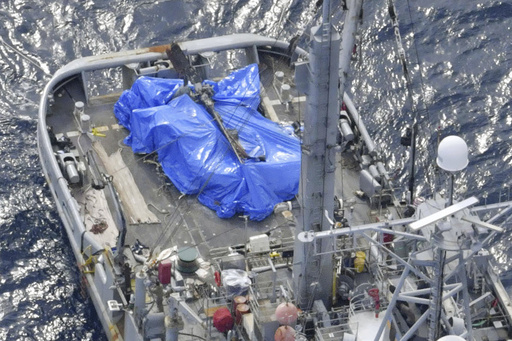
A blue sheet covers what believed to be a part of a crashed U.S. military Osprey aircraft on a U.S. salvage boat off Yakushima, Kagoshima prefecture, southern Japan on, Dec. 27, 2023. The U.S. Air Force on Friday, Jan. 12, 2024 announced the end of its more than a month long search and recovery operation at the site of a CV-22B Osprey crash that occurred off the southern Japanese coast in late November, expressing regret at not being able to find the last of the eight crew members killed. (Kyodo News via AP)
WASHINGTON — The Pentagon believes it has identified the mechanical failure that led to a fatal crash of an Osprey aircraft in Japan and the grounding of the fleet for two months, a U.S. defense official told The Associated Press. It is now weighing how the aircraft can be returned to service.
The Pentagon’s Joint Safety Council is now working with the Air Force, Navy and Marine Corps on their plans to get Osprey crews ready to fly again, said Navy Rear Adm. Chris Engdahl, chairman of the council and commander of Naval Safety Command.
The Air Force investigation is continuing into the Nov. 29 Air Force special operations command CV-22 crash, which killed eight service members. The crash led to a rare grounding on Dec. 6 of about 400 Osprey aircraft across the three services. Japan also grounded its fleet of 14 Ospreys following the crash.
READ: US military grounds entire fleet of Osprey aircraft after Japan crash
The official who said the mechanical failure had been identified declined to say what the failure was. It has opened the door to discussions on return to flight because mitigations can be put in place. The official was not authorized to discuss the investigation publicly and spoke on condition of anonymity.
While each service will determine when it returns its own fleets to the skies, the council is talking with “commanders across the services on what are their plans to come back to flight, what are their risk decisions,” Engdahl said. “In aviation, they’ve done this before, but probably not on this broad scale with a platform like we have in the V-22” Osprey.
That could include getting service-wide input on how many simulator hours are needed to get a crew back to proficiency, with what type of flying, and what maintenance is needed on each Osprey before they go up in the air again, Engdahl said.
Flight safety is dependent on pilots maintaining currency on an aircraft — meaning that they are flying regularly enough to be proficient in all types of flying, such as night missions, close formation flying or refueling. After 60 days of being grounded, that will be one of the key issues the services must prepare for as the Ospreys return to flight.
They also must make sure the aircraft are ready. Both the Air Force and Marine Corps have been running the Osprey’s engines; the Marines have been conducting ground movements to keep the aircraft working.
Marine Corps leadership is also working on a message to send throughout the service that could give each unit up to 30 days to recertify their crews and ensure they are ready to return to flight, said a second defense official, who also spoke on condition of anonymity to discuss details that have not been announced publicly.
READ: US Air Force: Wreckage, 5 bodies from crashed Osprey aircraft found
Marine Corps spokeswoman Capt. Alyssa Myers said the service is cooperating closely with the Air Force and Navy “to make an informed decision for the MV-22’s return to flight. The safety and well-being of our personnel and the reliability of the V-22 continues to be a priority in our discussions as we determine our return to flight.”
The Osprey is a fast-moving airframe that can take off like a helicopter and then tilt its engines and rotor blades to a horizontal position to fly like an airplane.
While the current Osprey standdown is one of the largest military aircraft groundings in terms of affecting three services’ flight operations, it’s not the longest. When the Osprey was still in development, two Osprey crashes in 2000 killed 23 Marines and led the Marine Corps to ground the program for nearly 18 months.
The Joint Safety Council was established by Congress to get a stronger services-wide look at safety issues following a string of deadly aviation crashes in 2018.

